Completed evaluations
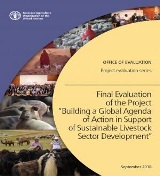
Final Evaluation of the Project “Building a Global Agenda of Action in Support of Sustainable Livestock Sector Development”
01/02/2019
Is sustainable livestock production possible, and if so, what does it look like? The livestock sector is at the center of climate and environmental issues, and plays a major role in poverty reduction and food security and nutrition.
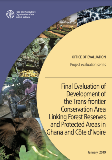
Final Evaluation of Development of the Trans-frontier Conservation Area Linking Forest Reserves and Protected Areas in Ghana and Côte d'Ivoire
16/01/2019
The project sought to construct a conservation corridor between Cote d’Ivoire and Ghana in the Bia-Diambarakro area, a priority landscape for forest conservation and also home to endemic species.
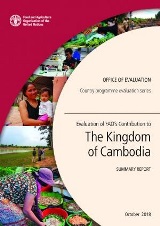
Evaluation of FAO’s Contribution to The Kingdom of Cambodia
04/12/2018
Evaluation of FAO’s Contribution to Cambodia Although Cambodia is rapidly transitioning to a more industrialised economy, the country is still among the poorest in Southeast Asia, and the risk of sliding back into poverty remains high, especially for rural households.
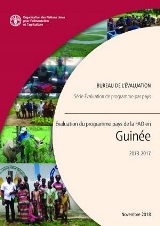
Evaluation of FAO’s Contribution to Guinea
30/11/2018
In 2012, approximately 55 percent of the Guinean population lived below the national poverty line. The crisis caused by the Ebola virus in 2014-2015 hit the country hard, hampering the actions undertaken by FAO to strengthen the resilience of populations in terms of food security. Many unplanned projects have been implemented to deal with the state of emergency in the country.
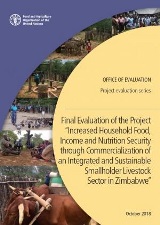
Final Evaluation of the Project “Increased Household Food, Income and Nutrition Security through Commercialization of an Integrated and Sustainable Smallholder Livestock Sector in Zimbabwe”
26/11/2018
The Final Evaluation of the Project “Increased Household Food, Income and Nutrition Security through Commercialization of an Integrated and Sustainable Smallholder Livestock Sector in Zimbabwe” concluded that the Project’s objective of changing mindsets of smallholder livestock farmers to view livestock as important economic assets more than a social asset was very relevant and timely.
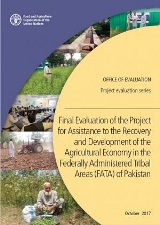
Final Evaluation of the Project for Assistance to the Recovery and Development of the Agricultural Economy in the Federally Administered Tribal Areas (FATA) of Pakistan
15/11/2018
The “Project for Assistance to the Recovery and Development of the Agricultural Economy in the Federally Administered Tribal Areas (FATA) of Pakistan” attempted to make a significant contribution to the stabilization of the area and enhanced food security through sustainable agriculture development,
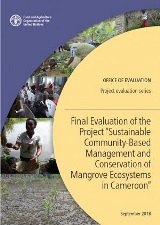
Final Evaluation of the Project “Sustainable Community-Based Management and Conservation of Mangrove Ecosystems in Cameroon”
29/10/2018
Mangrove ecosystems provide a wide range of resources and services for people's livelihoods, which at the same time give rise to strong economic, social and demographic pressure. To address these challenges, the GEF project "Sustainable community-based management and conservation of mangrove ecosystems in Cameroon” developed strategic documents on mangroves; created...
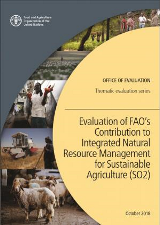
Evaluation of FAO’s Contribution to Sustainable Agricultural Development through Integrated Natural Resource Management through Strategic Objective 2 (SO2)
23/10/2018
The focus of Strategic Objective 2 stems from FAO’s vision for sustainable agriculture, which is at the heart of the 2030 Agenda. This evaluation assessed FAO’s efforts in promoting integrated approaches for making agriculture, forestry and fisheries more productive and sustainable.
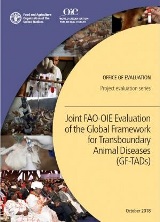
Joint FAO-OIE Evaluation of the Global Framework for Transboundary Animal Diseases (GF-TADs)
17/10/2018
The Global Framework for the Control of Transboundary Animal Diseases (GF-TADs) is a joint governance mechanism of FAO and the World Organisation for Animal Health (OIE) launched in 2004 to achieve coordinated prevention and control of transboundary animal diseases (TADs), and in particular to address their regional and global dimensions.
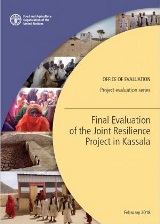
Final Evaluation of the Joint Resilience Project in Kassala
17/10/2018
Weather-related shocks in Kassala, Sudan, regularly affect the resilience of communities and their food security conditions. The Joint Resilience Project (JPR), designed to prevent malnutrition in order to build resilience to droughts and floods, opted to measure stunting to determine whether improved maternal and child health and nutrition, as well as enhanced adaptive capacity were achieved.
